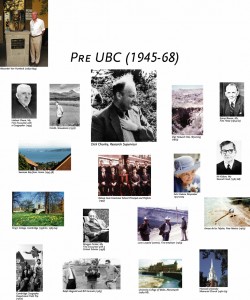 Olav decided at a very early age that physical geography would be his life interest. Accordingly, he obtained his B.A. (Hons.) in Geography at King’s College, Cambridge (possibly a unique achievement, there being no tutor in Geography in the college). He followed this with an A.M. in Geological Sciences on scholarship at Harvard, and then worked in the USGS under the supervision of the redoubtable Luna Leopold. He returned to Cambridge to do his Ph.D. on upland erosion and sediment yield in mid-Wales, under the tutelage of Dick Chorley. His thesis remains distinguished today as one of the very few large scale field studies to be conducted under strict rules of experimental design. Such an education has made him a well-rounded geomorphologist.
Olav decided at a very early age that physical geography would be his life interest. Accordingly, he obtained his B.A. (Hons.) in Geography at King’s College, Cambridge (possibly a unique achievement, there being no tutor in Geography in the college). He followed this with an A.M. in Geological Sciences on scholarship at Harvard, and then worked in the USGS under the supervision of the redoubtable Luna Leopold. He returned to Cambridge to do his Ph.D. on upland erosion and sediment yield in mid-Wales, under the tutelage of Dick Chorley. His thesis remains distinguished today as one of the very few large scale field studies to be conducted under strict rules of experimental design. Such an education has made him a well-rounded geomorphologist.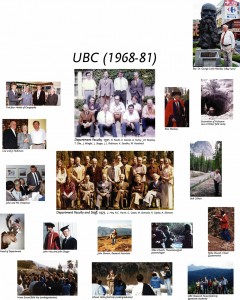 He began his teaching career at the University College of Wales, Aberystwyth (1964), but moved to the University of British Columbia in 1968, his academic home ever since. He became Professor — still a substantial achievement then — in 1982. Olav’s research and teaching focus has been on the drainage basin as the fundamental unit of enquiry for understanding subaerial landscape development, surely a central lesson of our time. His regional focus has been on mountain environments and his field research has been anchored in the Coast Mountains of British Columbia. But his interests as a geomorphologist / geographer are still wider, extending to resource and social development and stewardship of mountain regions.
He began his teaching career at the University College of Wales, Aberystwyth (1964), but moved to the University of British Columbia in 1968, his academic home ever since. He became Professor — still a substantial achievement then — in 1982. Olav’s research and teaching focus has been on the drainage basin as the fundamental unit of enquiry for understanding subaerial landscape development, surely a central lesson of our time. His regional focus has been on mountain environments and his field research has been anchored in the Coast Mountains of British Columbia. But his interests as a geomorphologist / geographer are still wider, extending to resource and social development and stewardship of mountain regions.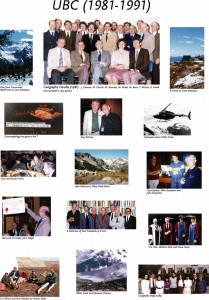
Some of his most important writings have been contributions toward understanding the connection between mountain landscapes and the societies that inhabit them. In recent years, he has broadened his interests farther to embrace the metaproblems of global environmental change and environmental sustainability. The number of his scientific papers is approaching 100, on top of which he has edited or co-edited 15 books, and co-authored another (Physical Geography and Global Environmental Change).
Olav has been an important institutional builder at UBC and a central builder of international geomorphology. In the university, he was Head of Geography (1982-91) in the period when the department came to major international stature, 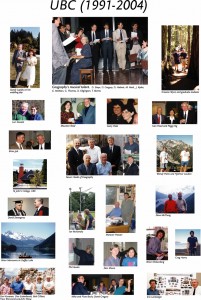 has been Associate Vice-President for Research, and played important roles in the establishment on campus of the Sustainable Development Research Institute and the Liu Centre for the Study of Global Issues. Beyond the university he was a Governor of the International Development Research Centre — a major Canadian initiative to build capacity for sustainability in less developed countries (1994-2002). In the profession, he has served the International Geographical Union by helping to organise, and then chair, the Commission on Field Experiments in Geomorphology, and he has served on the executive of the IGU. This commission provided much of the impetus for the founding of the International Association of Geomorphologists, of which he has been an executive member since 1989 (President, 1997-2001). He has also been president of the Canadian Association of Geographers (1991-1992).
has been Associate Vice-President for Research, and played important roles in the establishment on campus of the Sustainable Development Research Institute and the Liu Centre for the Study of Global Issues. Beyond the university he was a Governor of the International Development Research Centre — a major Canadian initiative to build capacity for sustainability in less developed countries (1994-2002). In the profession, he has served the International Geographical Union by helping to organise, and then chair, the Commission on Field Experiments in Geomorphology, and he has served on the executive of the IGU. This commission provided much of the impetus for the founding of the International Association of Geomorphologists, of which he has been an executive member since 1989 (President, 1997-2001). He has also been president of the Canadian Association of Geographers (1991-1992).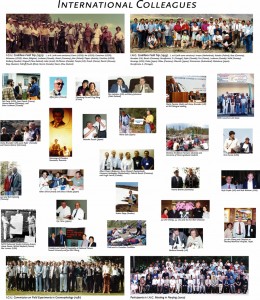
This career has attracted an array of honours and awards. Of most interest to us, perhaps, are the Certificate of Merit of the Japanese Geomorphological Union (1985), his election to membership of the Norwegian Academy of Science and Letters (1989), and the 2003 David Linton Award of the British Geomorphological Research Group. An outstanding career continues.